Korean hotels are no longer merely places to stay when away from home. Premium hotels have become a venue for guest services tailored to various lifestyles. This has even turned some of them into destinations themselves, especially among young adults, who highly value experiences that are out of the ordinary.
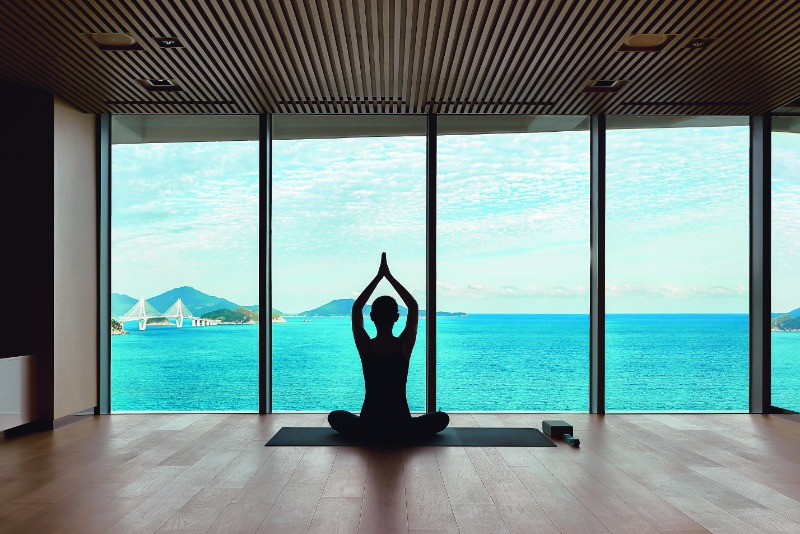
Geoje Belvedere, a resort on Geoje Island, offers a wellness program that allows guests an unobstructed view of the sea as they practice yoga. In recent years, hotels have become places for healing and total relaxation.
© Hanwha Hotels & Resorts
Hotels are synonymous with travel. Decide where to go, then where to stay – it’s a timeless thought process. But now, this sequence may be done in reverse. “Monocle,” the “magazine for hipsters,” predicts that travel will soon come to mean refreshing our everyday creativity through extraordinary experiences. For premium hotels, providing comfortable accommodations for relaxation and a good night’s sleep will not be enough.
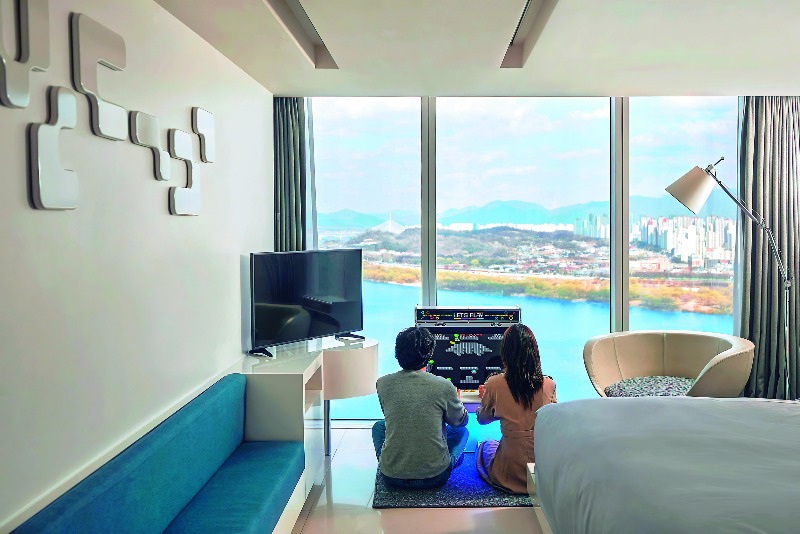
Guests at Vista Walkerhill Seoul can play retro arcade games in their rooms. To appeal to the MZ generation, the new target group, packages that reflect the tastes of young adults are steadily being developed.
© WALKERHILL HOTELS & RESORTS
Hotels as Playgrounds
In addition to sightseeing, shopping and visiting entertainment venues, guests may be just as interested in spending time at their hotel. To satisfy their whims, hotels are increasingly providing amenities and services outside of the norms of the hospitality industry. In short, they are crossing into the world of entertainment as they become destinations themselves.
Traditionally, high-end hotels have been the domain of the wealthy, but now they are transforming into playgrounds for young people. Behind this change is the so-called Generation MZ (Millennials and Generation Z), comprised of individuals in their 20s and 30s. Generally more willing to splurge for an experience, they have become the new target clientele. More and more, Korean hotels are creating unique services catering to their interests and lifestyles.
Earlier this year, Andaz, a luxury boutique hotel in Gangnam, Seoul, offered a “Love Yourself ” package featuring a body profile photo shoot. Having a professional photo session after months of exercise and healthy eating has become a trend among MZers who want a record of their youthful, healthy appearance. The package emphasized that shooting a “body profile” isn’t flaunting but rather an act of improving one’s self-esteem by keeping healthy and fit. The package also included meal vouchers and use of the hotel swimming pool and gym.
Meanwhile, the five-star Hotel Paradise Busan and Paradise City (Hotel) in Incheon tapped into the Myers-Briggs Type Indicator (MBTI) test, a self-report that gauges how an individual thinks, perceives and behaves, and places people in several personality categories. For example, one is either E (extrovert) or I (introvert). The test is currently so popular among young Korean adults that some use their results as a means to introduce themselves. The Paradise brand hotels’ MBTI-E Package featured a variety of activities outside the hotel, whereas the MBTI-I Package had programs for relaxation and culinary experiences inside the hotel.
Jumping on the retro trend that has recently revitalized film cameras, Kolon brand hotels offered cameras loaded with black-and-white film in their spring package. Having grown up with smartphones and digital cameras, many young adults are strangers to film. The offer allowed them to experience analog photography the same way their parents and grandparents did.
Environmental awareness and veganism have also gained traction among MZers, who tend to make purchase decisions based on their own ideas and beliefs. As demand for eco-friendly travel increases, hotel amenities have changed accordingly. Some hotels have joined the cause of reducing plastic waste, while others offer expanded vegan menus and vegan cocktails to cater to the values of their young guests.
Wholesome Refreshment
Emphasizing hotels as healing spaces, dedicated only to relaxation and refreshment, is another trend. Empty gazing at a burning fire or the waters of lakes or rivers is a popular way of decompressing and taking a mental break. Called meong ttaerigi (“meong” meaning “blank” and “ttaerigi” meaning “to go” in Korean), this idea of inactivity was initially frowned upon because it did not appear to be productive. But medical opinion has pointed out the therapeutic effects of taking regular psychological breaks in a fast-paced, competitive society. The art of doing nothing gained even greater attention during the COVID-19 pandemic as emotional fatigue mounted.
Many hotels have released various meong ttaerigi packages – “sea meong” for relaxing on a hotel terrace looking out at the sea, feeling cool breezes and listening to music; “sound meong” for attaining peace of mind by concentrating on the vibrations of a singing bowl, a meditation tool, or using ASMR (autonomous sensory meridian response, a trend of listening to pleasant, gentle, repetitive noises); and “forest meong” for a stroll through a forest enjoying the scent of greenery and wild trees.
Another notable trend among hotels is their response to the heightened interest in art among a wider range of people over the last few years. Since its inception, Paradise City (Hotel) near Incheon International Airport has been committed to the concept of “Art-tainment.” It showcases works by established artists from home and abroad as well as rising artists patronized by the Paradise Group. The collection is so varied that a tour around the hotel premises is enough to gain a general grasp of modern art. A sculpture by the Japanese artist Yayoi Kusama, which attracted great attention when the hotel opened, contributed to the building’s reputation as a good photo spot among MZers, who like to share their experiences on social media.
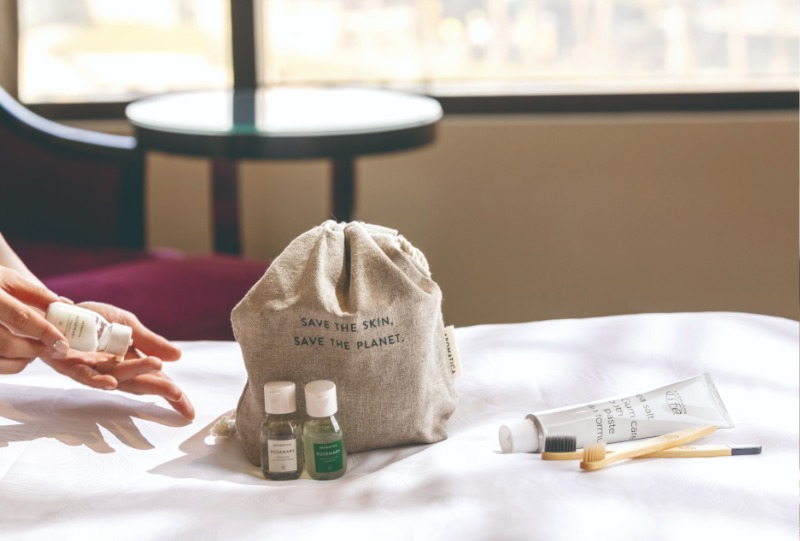
Eco-friendly campaigns to reduce waste generated during hotel stays are a recent trend in the hospitality industry. The photo shows the eco-friendly amenities included in a seasonal limited-time offer at JW Marriott Dongdaemun Square Seoul.
© JW Marriott Dongdaemun Square Seoul
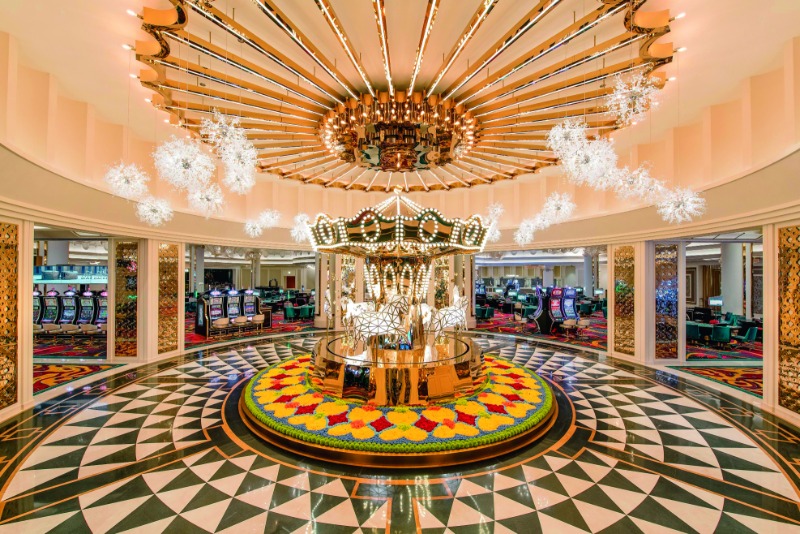
“Gold Carousel,” installed in the casino at Paradise City, is a kinetic work by Mioon, the artistic couple Choi Moon-seon and Kim Min-seon. With a rapidly growing art-loving demographic, hotels are transforming into places where guests can indulge their artistic sensibilities.
© PARADISE CITY
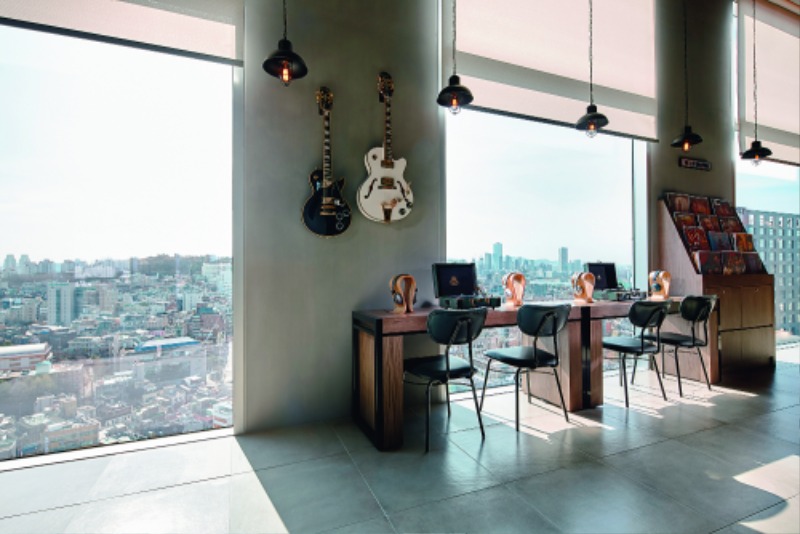
At L7 HONGDAE, in the Hongik University area of Seoul, guests can listen to LP records of their own choice. This service reflects the personality of the neighborhood, where busking indie musicians and varied cultural events are permanent fixtures.
© LOTTE HOTELS & RESORTS
Local Community
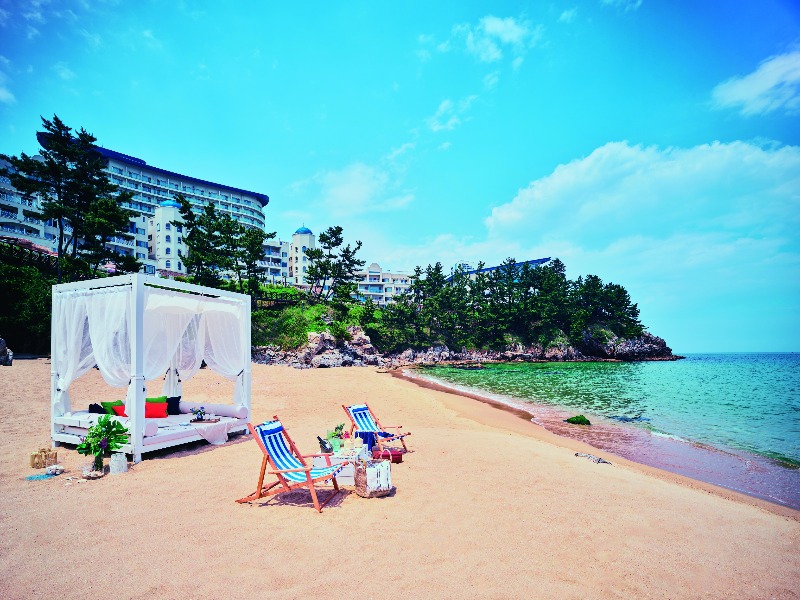
The beach front of SOL BEACH SAMCHEOK is inspired by Santorini in Greece. Lounge chairs and other hotel amenities encourage holidaymakers to bask in the sun and sea breeze. Responding to the wellness trend of “spacing out,” coastal hotels are offering a myriad of services that invite guests to relax by the ocean.
© SONO INTERNATIONAL Co., Ltd.
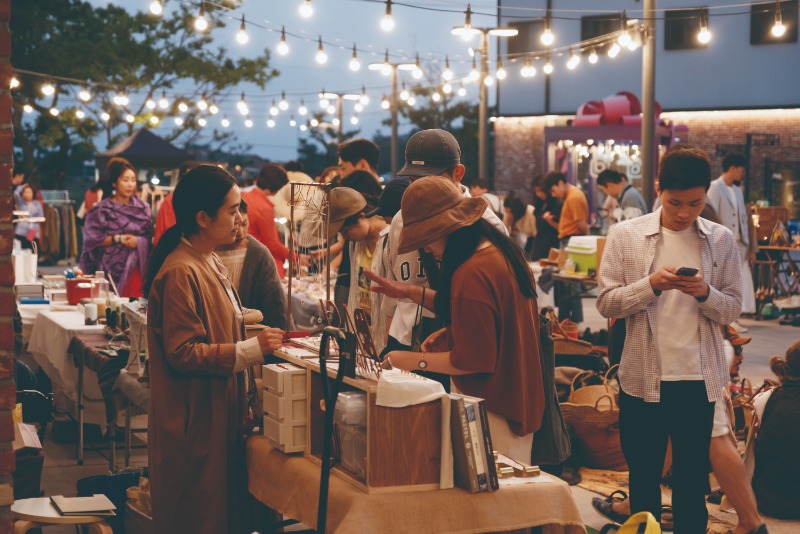
Golmok Market, a flea market, is held every Saturday in the plaza at Playce Camp Jeju, where local creators come to sell products of their own making.
© Playce Camp Jeju
Also noteworthy is the increasing emphasis on connecting with local communities. For example, Maison Glad Jeju, located on Jeju Island, has offered a tour of places within an hour’s drive from the hotel. Visiting major tourist attractions as well as hidden gems recommended by locals, the tour was planned to give customers a more intimate experience of the island.
Kolon Hotel Gyeongju launched a gastronomic package that high lights the city’s past glory as the capital of the ancient kingdom of Silla. The package included tea and dinner based on royal recipes from the thirteenth-century text “Memorabilia of the Three Kingdoms” (Samguk yusa), along with a chance to learn a little about Korean history.
A new model emerging in the same context is community hotels. These accommodations connect travelers with local residents and their history, food and surroundings. Some examples are Local Stitch in Seoul; Bonghwangjae in Gongju, South Chungcheong Province; Village Hotel in Jeongseon, Gangwon Province; and Playce Camp Jeju in Seongsan on the eastern coast of Jeju Island, which provide rooms and commercial facilities catering to young tastes, a variety of outdoor activities, and access to hotel facilities and group sessions in art, yoga and writing.
Choi Ji-hye Researcher, Seoul National University Consumer Trend Center